Full text
PDF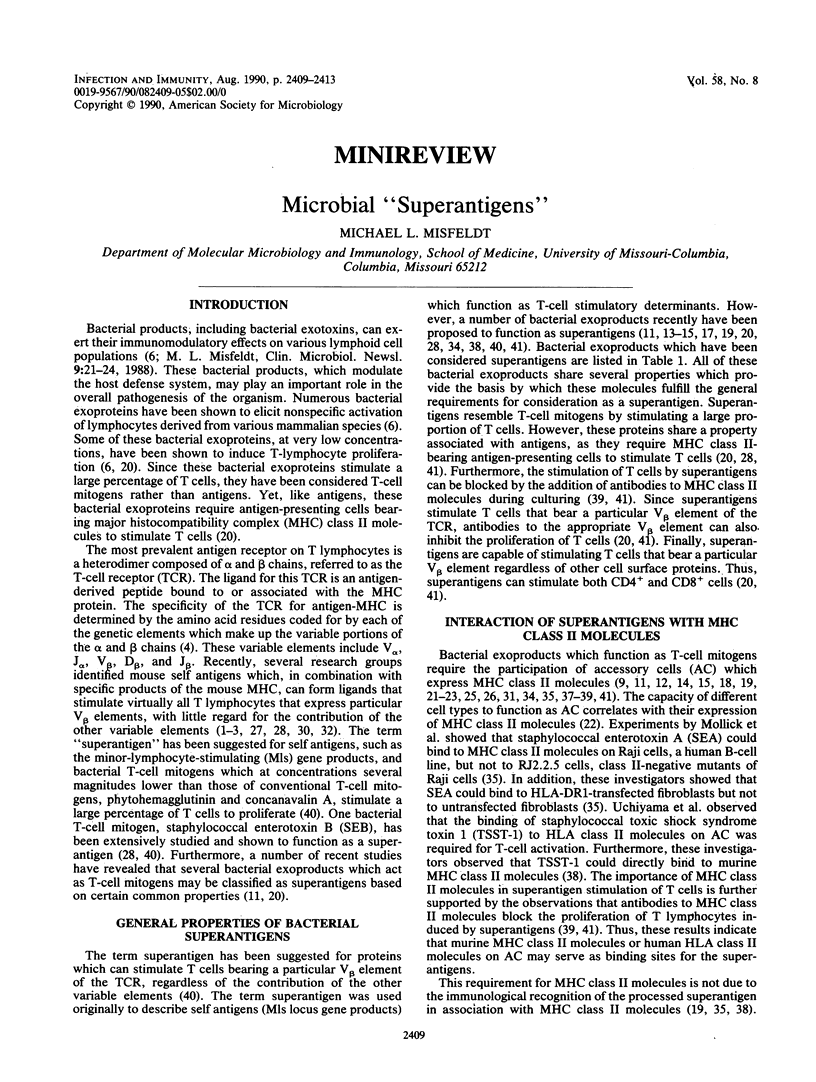
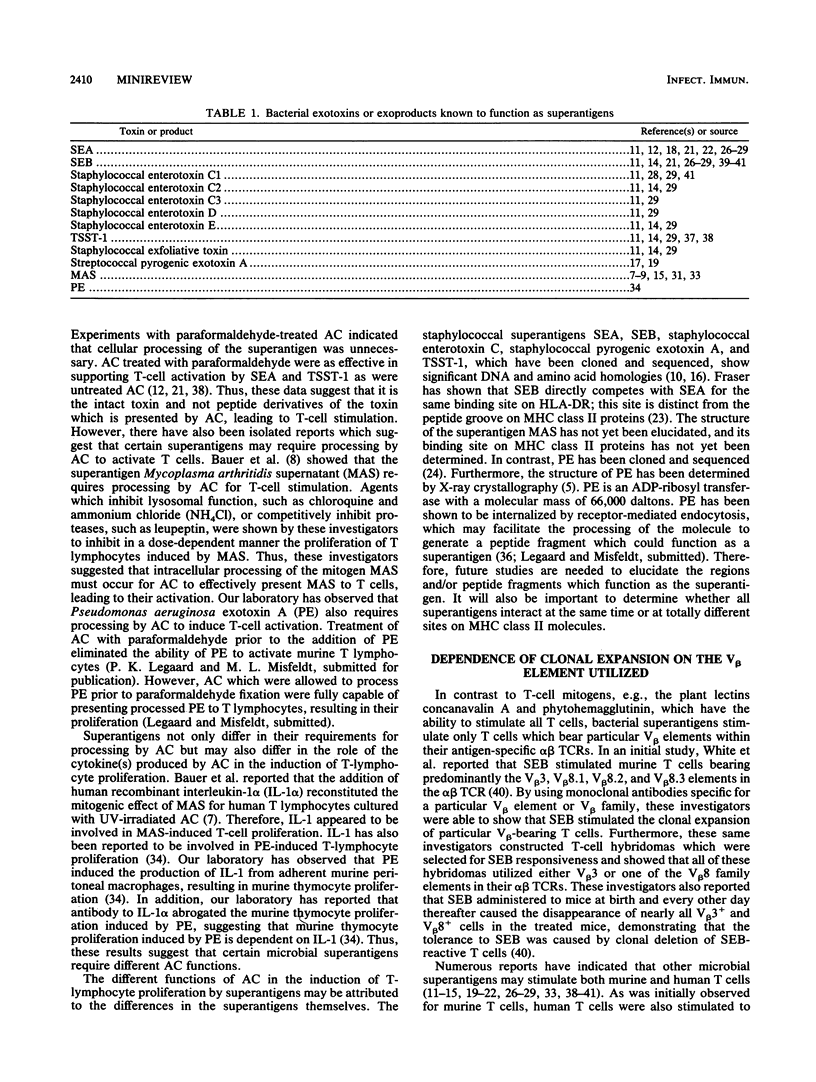
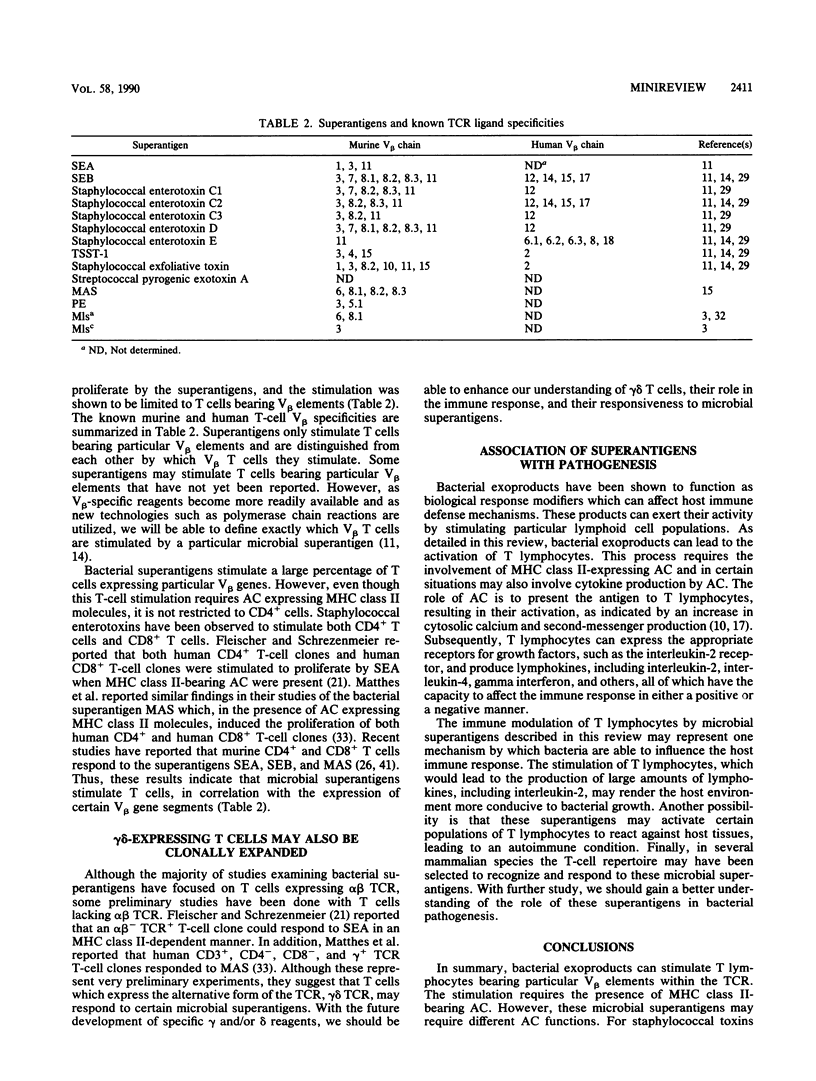
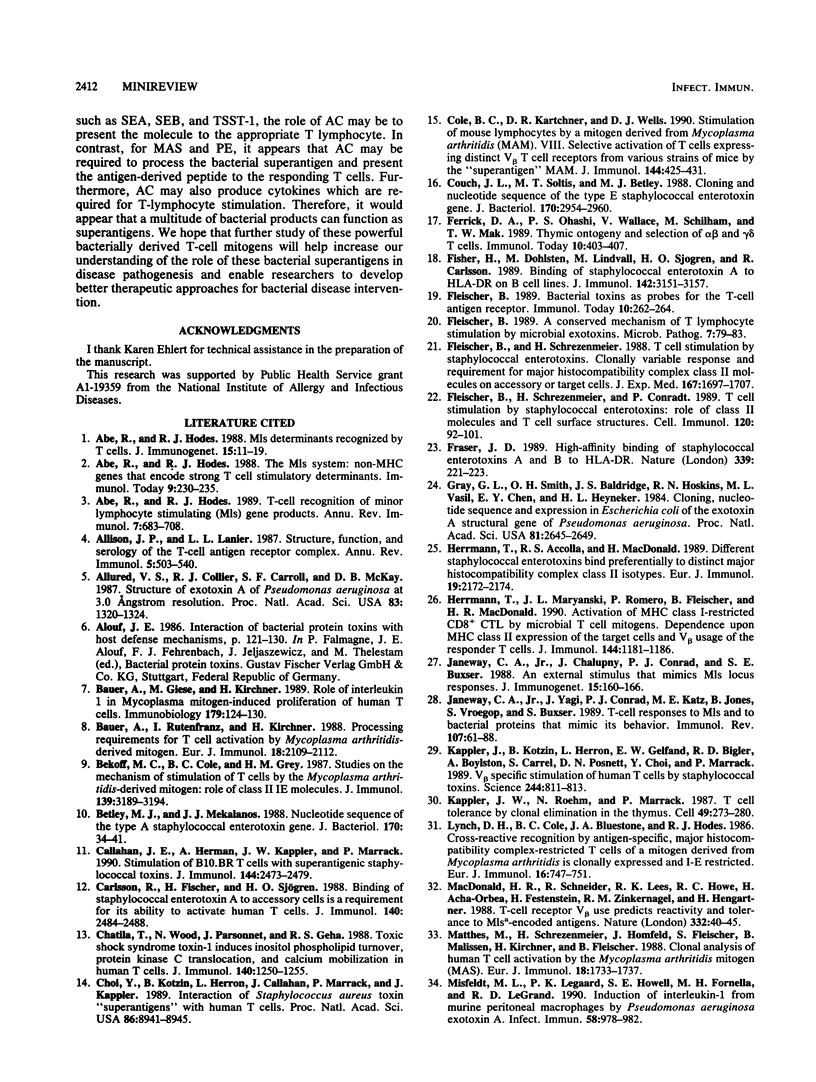
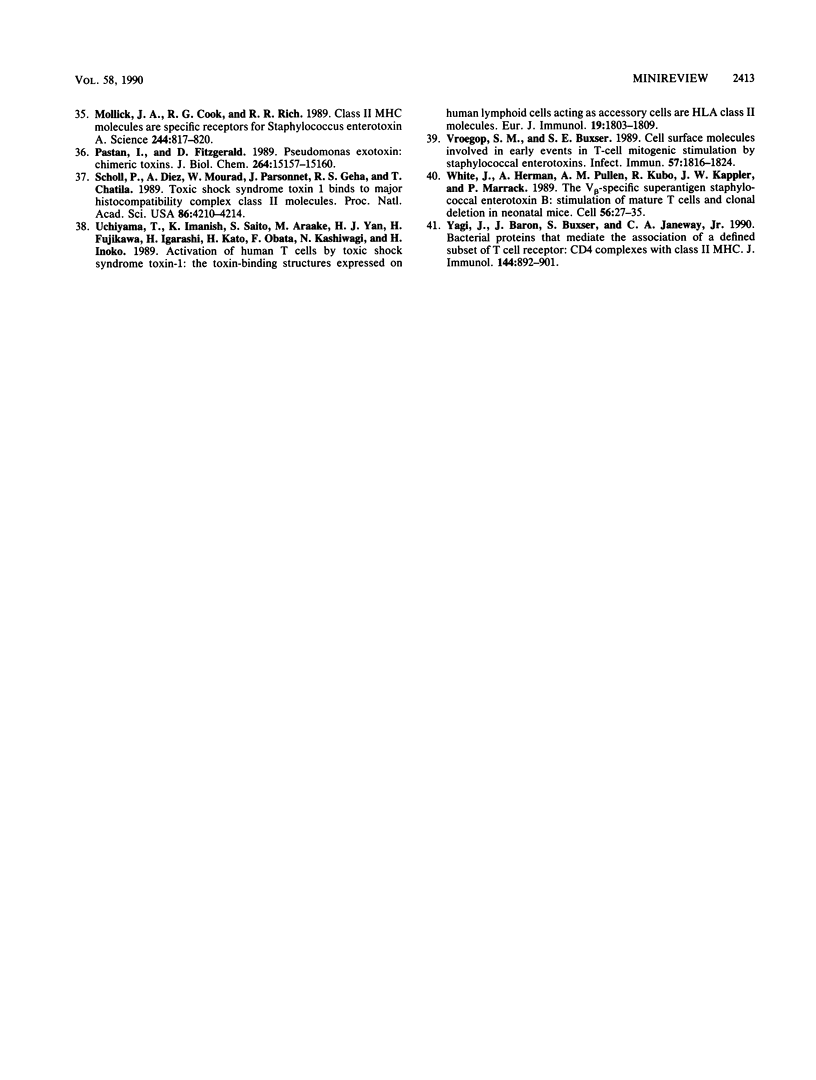
Selected References
These references are in PubMed. This may not be the complete list of references from this article.
- Abe R., Hodes R. J. Mls determinants recognized by T cells. J Immunogenet. 1988 Feb-Jun;15(1-3):11–19. doi: 10.1111/j.1744-313x.1988.tb00403.x. [DOI] [PubMed] [Google Scholar]
- Abe R., Hodes R. J. T-cell recognition of minor lymphocyte stimulating (Mls) gene products. Annu Rev Immunol. 1989;7:683–708. doi: 10.1146/annurev.iy.07.040189.003343. [DOI] [PubMed] [Google Scholar]
- Abe R., Hodes R. J. The Mls system: non-MHC genes that encode strong T-cell stimulatory determinants. Immunol Today. 1988 Jul-Aug;9(7-8):230–235. doi: 10.1016/0167-5699(88)91221-2. [DOI] [PubMed] [Google Scholar]
- Allison J. P., Lanier L. L. Structure, function, and serology of the T-cell antigen receptor complex. Annu Rev Immunol. 1987;5:503–540. doi: 10.1146/annurev.iy.05.040187.002443. [DOI] [PubMed] [Google Scholar]
- Allured V. S., Collier R. J., Carroll S. F., McKay D. B. Structure of exotoxin A of Pseudomonas aeruginosa at 3.0-Angstrom resolution. Proc Natl Acad Sci U S A. 1986 Mar;83(5):1320–1324. doi: 10.1073/pnas.83.5.1320. [DOI] [PMC free article] [PubMed] [Google Scholar]
- Bauer A., Giese M., Kirchner H. Role of interleukin 1 in mycoplasma mitogen-induced proliferation of human T cells. Immunobiology. 1989 Mar;179(1):124–130. doi: 10.1016/S0171-2985(89)80011-7. [DOI] [PubMed] [Google Scholar]
- Bauer A., Rutenfranz I., Kirchner H. Processing requirements for T cell activation by Mycoplasma arthritidis-derived mitogen. Eur J Immunol. 1988 Dec;18(12):2109–2112. doi: 10.1002/eji.1830181239. [DOI] [PubMed] [Google Scholar]
- Bekoff M. C., Cole B. C., Grey H. M. Studies on the mechanism of stimulation of T cells by the Mycoplasma arthritidis-derived mitogen. Role of class II IE molecules. J Immunol. 1987 Nov 15;139(10):3189–3194. [PubMed] [Google Scholar]
- Callahan J. E., Herman A., Kappler J. W., Marrack P. Stimulation of B10.BR T cells with superantigenic staphylococcal toxins. J Immunol. 1990 Apr 1;144(7):2473–2479. [PubMed] [Google Scholar]
- Carlsson R., Fischer H., Sjögren H. O. Binding of staphylococcal enterotoxin A to accessory cells is a requirement for its ability to activate human T cells. J Immunol. 1988 Apr 15;140(8):2484–2488. [PubMed] [Google Scholar]
- Chatila T., Wood N., Parsonnet J., Geha R. S. Toxic shock syndrome toxin-1 induces inositol phospholipid turnover, protein kinase C translocation, and calcium mobilization in human T cells. J Immunol. 1988 Feb 15;140(4):1250–1255. [PubMed] [Google Scholar]
- Choi Y. W., Kotzin B., Herron L., Callahan J., Marrack P., Kappler J. Interaction of Staphylococcus aureus toxin "superantigens" with human T cells. Proc Natl Acad Sci U S A. 1989 Nov;86(22):8941–8945. doi: 10.1073/pnas.86.22.8941. [DOI] [PMC free article] [PubMed] [Google Scholar]
- Cole B. C., Kartchner D. R., Wells D. J. Stimulation of mouse lymphocytes by a mitogen derived from Mycoplasma arthritidis (MAM). VIII. Selective activation of T cells expressing distinct V beta T cell receptors from various strains of mice by the "superantigen" MAM. J Immunol. 1990 Jan 15;144(2):425–431. [PubMed] [Google Scholar]
- Couch J. L., Soltis M. T., Betley M. J. Cloning and nucleotide sequence of the type E staphylococcal enterotoxin gene. J Bacteriol. 1988 Jul;170(7):2954–2960. doi: 10.1128/jb.170.7.2954-2960.1988. [DOI] [PMC free article] [PubMed] [Google Scholar]
- Ferrick D. A., Ohashi P. S., Wallace V., Schilham M., Mak T. W. Thymic ontogeny and selection of alpha beta and gamma delta T cells. Immunol Today. 1989 Dec;10(12):403–407. doi: 10.1016/0167-5699(89)90035-2. [DOI] [PubMed] [Google Scholar]
- Fischer H., Dohlsten M., Lindvall M., Sjögren H. O., Carlsson R. Binding of staphylococcal enterotoxin A to HLA-DR on B cell lines. J Immunol. 1989 May 1;142(9):3151–3157. [PubMed] [Google Scholar]
- Fleischer B. A conserved mechanism of T lymphocyte stimulation by microbial exotoxins. Microb Pathog. 1989 Aug;7(2):79–83. doi: 10.1016/0882-4010(89)90027-2. [DOI] [PubMed] [Google Scholar]
- Fleischer B. Bacterial toxins as probes for the T-cell antigen receptor. Immunol Today. 1989 Aug;10(8):262–264. doi: 10.1016/0167-5699(89)90137-0. [DOI] [PubMed] [Google Scholar]
- Fleischer B., Schrezenmeier H., Conradt P. T lymphocyte activation by staphylococcal enterotoxins: role of class II molecules and T cell surface structures. Cell Immunol. 1989 Apr 15;120(1):92–101. doi: 10.1016/0008-8749(89)90177-9. [DOI] [PubMed] [Google Scholar]
- Fleischer B., Schrezenmeier H. T cell stimulation by staphylococcal enterotoxins. Clonally variable response and requirement for major histocompatibility complex class II molecules on accessory or target cells. J Exp Med. 1988 May 1;167(5):1697–1707. doi: 10.1084/jem.167.5.1697. [DOI] [PMC free article] [PubMed] [Google Scholar]
- Fraser J. D. High-affinity binding of staphylococcal enterotoxins A and B to HLA-DR. Nature. 1989 May 18;339(6221):221–223. doi: 10.1038/339221a0. [DOI] [PubMed] [Google Scholar]
- Gray G. L., Smith D. H., Baldridge J. S., Harkins R. N., Vasil M. L., Chen E. Y., Heyneker H. L. Cloning, nucleotide sequence, and expression in Escherichia coli of the exotoxin A structural gene of Pseudomonas aeruginosa. Proc Natl Acad Sci U S A. 1984 May;81(9):2645–2649. doi: 10.1073/pnas.81.9.2645. [DOI] [PMC free article] [PubMed] [Google Scholar]
- Herrmann T., Accolla R. S., MacDonald H. R. Different staphylococcal enterotoxins bind preferentially to distinct major histocompatibility complex class II isotypes. Eur J Immunol. 1989 Nov;19(11):2171–2174. doi: 10.1002/eji.1830191131. [DOI] [PubMed] [Google Scholar]
- Herrmann T., Maryanski J. L., Romero P., Fleischer B., MacDonald H. R. Activation of MHC class I-restricted CD8+ CTL by microbial T cell mitogens. Dependence upon MHC class II expression of the target cells and V beta usage of the responder T cells. J Immunol. 1990 Feb 15;144(4):1181–1186. [PubMed] [Google Scholar]
- Janeway C. A., Jr, Yagi J., Conrad P. J., Katz M. E., Jones B., Vroegop S., Buxser S. T-cell responses to Mls and to bacterial proteins that mimic its behavior. Immunol Rev. 1989 Feb;107:61–88. doi: 10.1111/j.1600-065x.1989.tb00003.x. [DOI] [PubMed] [Google Scholar]
- Kappler J. W., Roehm N., Marrack P. T cell tolerance by clonal elimination in the thymus. Cell. 1987 Apr 24;49(2):273–280. doi: 10.1016/0092-8674(87)90568-x. [DOI] [PubMed] [Google Scholar]
- Kappler J., Kotzin B., Herron L., Gelfand E. W., Bigler R. D., Boylston A., Carrel S., Posnett D. N., Choi Y., Marrack P. V beta-specific stimulation of human T cells by staphylococcal toxins. Science. 1989 May 19;244(4906):811–813. doi: 10.1126/science.2524876. [DOI] [PubMed] [Google Scholar]
- Lynch D. H., Cole B. C., Bluestone J. A., Hodes R. J. Cross-reactive recognition by antigen-specific, major histocompatibility complex-restricted T cells of a mitogen derived from Mycoplasma arthritidis is clonally expressed and I-E restricted. Eur J Immunol. 1986 Jul;16(7):747–751. doi: 10.1002/eji.1830160706. [DOI] [PubMed] [Google Scholar]
- MacDonald H. R., Schneider R., Lees R. K., Howe R. C., Acha-Orbea H., Festenstein H., Zinkernagel R. M., Hengartner H. T-cell receptor V beta use predicts reactivity and tolerance to Mlsa-encoded antigens. Nature. 1988 Mar 3;332(6159):40–45. doi: 10.1038/332040a0. [DOI] [PubMed] [Google Scholar]
- Matthes M., Schrezenmeier H., Homfeld J., Fleischer S., Malissen B., Kirchner H., Fleischer B. Clonal analysis of human T cell activation by the Mycoplasma arthritidis mitogen (MAS). Eur J Immunol. 1988 Nov;18(11):1733–1737. doi: 10.1002/eji.1830181112. [DOI] [PubMed] [Google Scholar]
- Misfeldt M. L., Legaard P. K., Howell S. E., Fornella M. H., LeGrand R. D. Induction of interleukin-1 from murine peritoneal macrophages by Pseudomonas aeruginosa exotoxin A. Infect Immun. 1990 Apr;58(4):978–982. doi: 10.1128/iai.58.4.978-982.1990. [DOI] [PMC free article] [PubMed] [Google Scholar]
- Mollick J. A., Cook R. G., Rich R. R. Class II MHC molecules are specific receptors for staphylococcus enterotoxin A. Science. 1989 May 19;244(4906):817–820. doi: 10.1126/science.2658055. [DOI] [PubMed] [Google Scholar]
- Pastan I., FitzGerald D. Pseudomonas exotoxin: chimeric toxins. J Biol Chem. 1989 Sep 15;264(26):15157–15160. [PubMed] [Google Scholar]
- Scholl P., Diez A., Mourad W., Parsonnet J., Geha R. S., Chatila T. Toxic shock syndrome toxin 1 binds to major histocompatibility complex class II molecules. Proc Natl Acad Sci U S A. 1989 Jun;86(11):4210–4214. doi: 10.1073/pnas.86.11.4210. [DOI] [PMC free article] [PubMed] [Google Scholar]
- Uchiyama T., Imanishi K., Saito S., Araake M., Yan X. J., Fujikawa H., Igarashi H., Kato H., Obata F., Kashiwagi N. Activation of human T cells by toxic shock syndrome toxin-1: the toxin-binding structures expressed on human lymphoid cells acting as accessory cells are HLA class II molecules. Eur J Immunol. 1989 Oct;19(10):1803–1809. doi: 10.1002/eji.1830191007. [DOI] [PubMed] [Google Scholar]
- Vroegop S. M., Buxser S. E. Cell surface molecules involved in early events in T-cell mitogenic stimulation by staphylococcal enterotoxins. Infect Immun. 1989 Jun;57(6):1816–1824. doi: 10.1128/iai.57.6.1816-1824.1989. [DOI] [PMC free article] [PubMed] [Google Scholar]
- White J., Herman A., Pullen A. M., Kubo R., Kappler J. W., Marrack P. The V beta-specific superantigen staphylococcal enterotoxin B: stimulation of mature T cells and clonal deletion in neonatal mice. Cell. 1989 Jan 13;56(1):27–35. doi: 10.1016/0092-8674(89)90980-x. [DOI] [PubMed] [Google Scholar]
- Yagi J., Baron J., Buxser S., Janeway C. A., Jr Bacterial proteins that mediate the association of a defined subset of T cell receptor:CD4 complexes with class II MHC. J Immunol. 1990 Feb 1;144(3):892–901. [PubMed] [Google Scholar]


